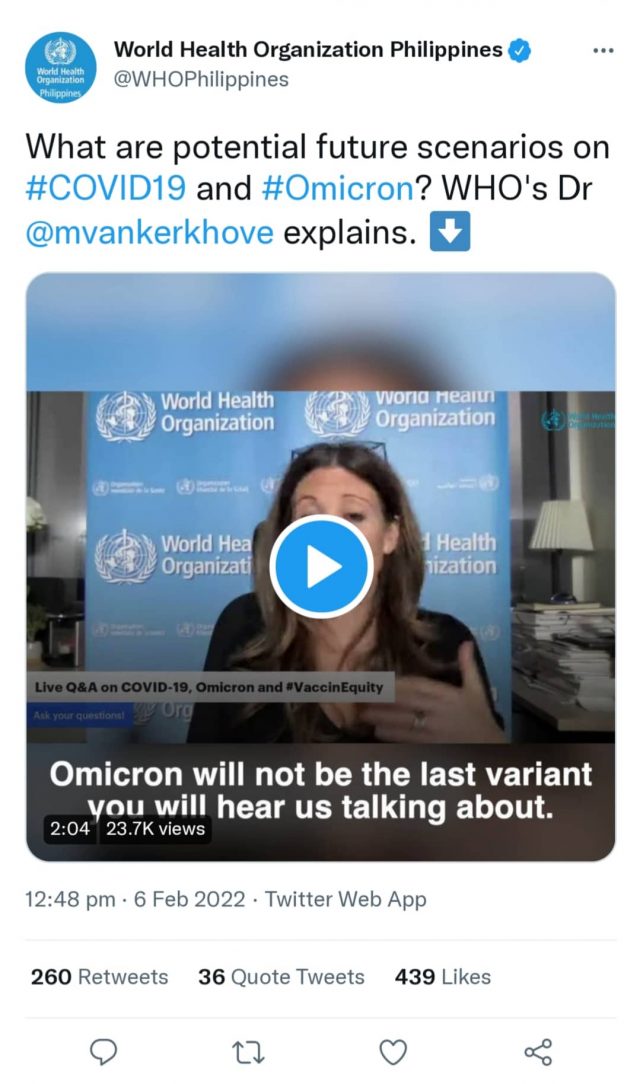Experts have cautioned that the next COVID-19 variation will be more transmissible, and maybe more deadly than its predecessors, even as the globe returns to normalcy with the Omicron wave diminishing.
Dr Maria Van Kerkhove, WHO epidemiologist and technical lead on COVID-19, stated in a recent press conference that the pandemic is far from over and that subsequent varieties will be more aggressive than Omicron is currently.
The Evolution Of Delta And Omicron
The WHO has classified the Delta variant, which was initially discovered in India in October 2020, as a variant of concern. The Delta version spread 50% quicker than the Alpha variant, which was 50% more contagious than the initial strain of SARS-CoV-2, also known as the coronavirus.
Six months later, the Delta strain had decimated the country, killing lives and producing a record-breaking number of daily cases. By June 2021, it has caused a new wave of cases in the United Kingdom, Israel, Russia, Australia, and a number of other countries.
After being discovered in late November 2021 in South Africa, Omicron was quickly labelled as a variant of concern. In a much shorter time, Omicron has replaced Delta as the dominant strain. Omicron is at least two to four times more transmissible than Delta despite being milder. It also has a five-fold higher risk of reinfection than Delta, as well as an improved capacity to avoid vaccinations.
About The Next Variant
Dr. Van Kerkhove said, “The next variant of concern will be more fit, and what we mean by that is it will be more transmissible because it will have to overtake what is currently circulating. The big question is whether or not future variants will be more or less severe.”
She also warned that the next version could elude immunity more easily, making vaccines less effective. She emphasised the importance of taking the vaccine because it protects against serious sickness and death, as demonstrated during the Omicron wave.
“We expect that with the right interventions, the circulation of Covid-19 will be low. But even within those circulations, there will be flare-ups among people who are not protected by the vaccine or those who have waning immunity,” she added.
She cautioned against believing that the virus will continue to change into milder forms that cause fewer illnesses than previous strains.
“There is no guarantee of that. We hope that that is the case, but there is no guarantee of that and we can’t bank on it,” she added, adding that in the meanwhile, people should follow public safety precautions. Furthermore, the next version of Covid may be able to circumvent vaccine safeguards even further, rendering existing immunizations ineffective.
Also Read: ResearchED: Is There A Relationship Between COVID-19 And Heart Attacks?
Are We Getting Closer To The End?

There is, however, a silver lining. According to a study conducted at the Steve Biko Academic Hospital Complex in South Africa, Covid-19 may be phased out in the near future.
“Omicron may be a harbinger of the end of the epidemic phase of the Covid pandemic, ushering in its endemic phase,” the researchers speculated based on the findings.
These investigations, on the other hand, are simply suggestive and dependent on the appearance of new variations.
According to data published earlier this month by the UK Health Security Agency, booster doses are also up to 75% effective at preventing symptomatic infection from Omicron two to four weeks after the third shot.
Boosters, on the other hand, decline significantly after around 10 weeks, offering 45 percent to 50 percent protection against symptomatic infection, according to the study.
According to WHO officials, while Omicron appears to have peaked in certain countries, it is gaining hold in others. “You won’t have to wear a mask forever and you won’t have to physically distance yourself, but for now, we need to keep doing this,” Van Kerkhove said.
According to Dr. Mike Ryan, WHO’s head of emergency programmes, the virus will continue to change before it settles into a pattern. He believes it will eventually settle at a low level of transmission with periodic outbreaks. He believes it could become more seasonal or only affect disadvantaged groups.
The issue, he explained, is COVID’s unpredictability.
Disclaimer: THIS STORY IS FACT CHECKED
Sources: India Today, CNBC +more
Image Source: Google Images
Find the blogger @ParomaDey
This post is tagged under health, coronavirus, SARs-COV-2, covid, alpha, beta, delta, Omicron, Delmicron, third wave, World Health Organization, third wave, Satyendar Jain, Sutra model, IIT Kanpur, European Medicines Agency, Dr Monica Gandhi, Bloomberg, California University, Professor Ian Jones, University of Reading, Dr Maria Van Kerkhove, Dr. Mike Ryan, Steve Biko Academic Hospital Complex, UK Health Security Agency
We do not hold any right, copyright over any of the images used, these have been taken from Google. In case of credits or removal, the owner may kindly mail us.
Read More:
When Will The Omicron Wave Peak In India And How Impactful Will It Be?





































